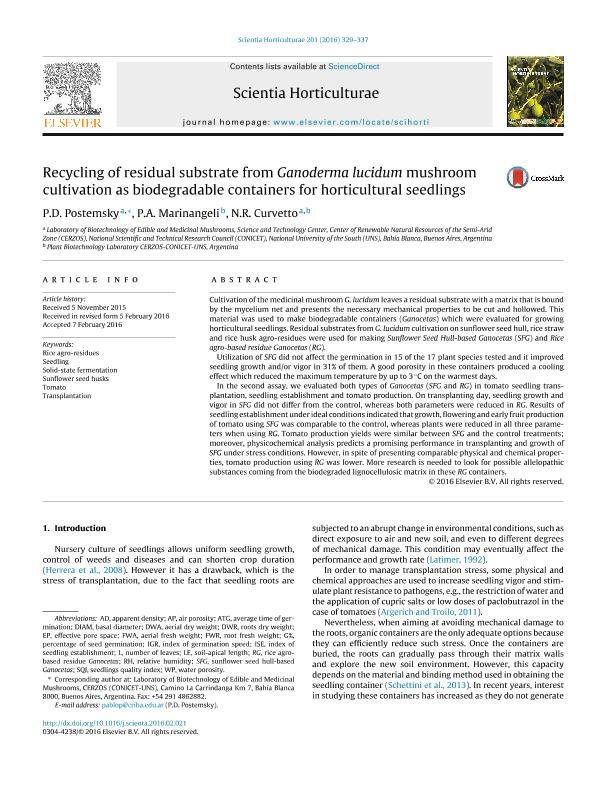Mostrar el registro sencillo del ítem
dc.contributor.author
Postemsky, Pablo Daniel

dc.contributor.author
Marinangeli, Pablo Alejandro

dc.contributor.author
Curvetto, Nestor Raul

dc.date.available
2017-09-28T18:09:48Z
dc.date.issued
2016-03
dc.identifier.citation
Postemsky, Pablo Daniel; Marinangeli, Pablo Alejandro; Curvetto, Nestor Raul; Recycling of residual substrate from Ganoderma lucidum mushroom cultivaion as biodegradable containers for horticultural seedlings; Elsevier Science; Scientia Horticulturae; 201; 3-2016; 329-337
dc.identifier.issn
0304-4238
dc.identifier.uri
http://hdl.handle.net/11336/25305
dc.description.abstract
Cultivation of the medicinal mushroom G. lucidum leaves a residual substrate with a matrix that is bound by the mycelium net and presents the necessary mechanical properties to be cut and hollowed. This material was used to make biodegradable containers (Ganocetas) which were evaluated for growing horticultural seedlings. Residual substrates from G. lucidum cultivation on sunflower seed hull, rice straw and rice husk agro-residues were used for making Sunflower Seed Hull-based Ganocetas (SFG) and Rice agro-based residue Ganocetas (RG).Utilization of SFG did not affect the germination in 15 of the 17 plant species tested and it improved seedling growth and/or vigor in 31% of them. A good porosity in these containers produced a cooling effect which reduced the maximum temperature by up to 3 ◦ C on the warmest days.In the second assay, we evaluated both types of Ganocetas (SFG and RG) in tomato seedling trans- plantation, seedling establishment and tomato production. On transplanting day, seedling growth and vigor in SFG did not differ from the control, whereas both parameters were reduced in RG. Results of seedling establishment under ideal conditions indicated that growth, flowering and early fruit production of tomato using SFG was comparable to the control, whereas plants were reduced in all three parame- ters when using RG. Tomato production yields were similar between SFG and the control treatments; moreover, physicochemical analysis predicts a promising performance in transplanting and growth of SFG under stress conditions. However, in spite of presenting comparable physical and chemical proper- ties, tomato production using RG was lower. More research is needed to look for possible allelopathic substances coming from the biodegraded lignocellulosic matrix in these RG containers.
dc.format
application/pdf
dc.language.iso
eng
dc.publisher
Elsevier Science

dc.rights
info:eu-repo/semantics/openAccess
dc.rights.uri
https://creativecommons.org/licenses/by-nc-sa/2.5/ar/
dc.subject
Rice Agro-Residues
dc.subject
Sunflower Seed Husks
dc.subject
Tomato
dc.subject
Solid-State Fermentation
dc.subject
Seedling
dc.subject
Transplantation
dc.subject.classification
Ética relacionada con Biotecnología Agrícola

dc.subject.classification
Biotecnología Agropecuaria

dc.subject.classification
CIENCIAS AGRÍCOLAS

dc.title
Recycling of residual substrate from Ganoderma lucidum mushroom cultivaion as biodegradable containers for horticultural seedlings
dc.type
info:eu-repo/semantics/article
dc.type
info:ar-repo/semantics/artículo
dc.type
info:eu-repo/semantics/publishedVersion
dc.date.updated
2017-07-27T12:27:02Z
dc.journal.volume
201
dc.journal.pagination
329-337
dc.journal.pais
Países Bajos

dc.journal.ciudad
Amsterdam
dc.description.fil
Fil: Postemsky, Pablo Daniel. Consejo Nacional de Investigaciones Científicas y Técnicas. Centro Científico Tecnológico Conicet - Bahía Blanca. Centro de Recursos Naturales Renovables de la Zona Semiarida. Universidad Nacional del Sur. Centro de Recursos Naturales Renovables de la Zona Semiarida; Argentina
dc.description.fil
Fil: Marinangeli, Pablo Alejandro. Consejo Nacional de Investigaciones Científicas y Técnicas. Centro Científico Tecnológico Conicet - Bahía Blanca. Centro de Recursos Naturales Renovables de la Zona Semiarida. Universidad Nacional del Sur. Centro de Recursos Naturales Renovables de la Zona Semiarida; Argentina
dc.description.fil
Fil: Curvetto, Nestor Raul. Consejo Nacional de Investigaciones Científicas y Técnicas. Centro Científico Tecnológico Conicet - Bahía Blanca. Centro de Recursos Naturales Renovables de la Zona Semiárida. Universidad Nacional del Sur. Centro de Recursos Naturales Renovables de la Zona Semiárida; Argentina
dc.journal.title
Scientia Horticulturae

dc.relation.alternativeid
info:eu-repo/semantics/altIdentifier/doi/http://dx.doi.org/10.1016/j.scienta.2016.02.021
dc.relation.alternativeid
info:eu-repo/semantics/altIdentifier/url/http://www.sciencedirect.com/science/article/pii/S0304423816300681
Archivos asociados
